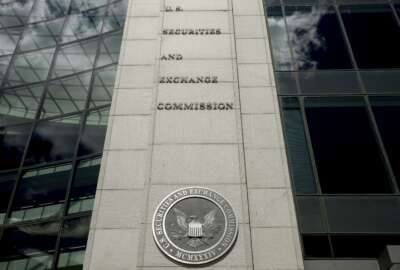Whistleblower protection legislation stalls amid congressional chaos
Whistleblower protection legislation often has bipartisan support. Yet it seems to take forever. A bill to extend federal protections to contractors was suppose...
Whistleblower protection legislation often has bipartisan support. Yet it seems to take forever. A bill to extend federal protections to contractors was supposed to get marked up in January in the House Committee on Homeland Security and Governmental Affairs. But now it is sidelined. For more, the Federal Drive Host Tom Temin spoke with Joe Spielberger, the policy counsel at the Project on Government Oversight (POGO).
Interview Transcript:
Tom Temin And this new bill, then is pretty significant. Let’s talk about the bill itself. What does it purport to do and why does it matter in the pantheon of whistleblower issues?
Joe Spielberger So the Expanding Whistleblower Protections for Contractors Act is a bipartisan bill. It was sponsored by Senators Gary Peters and Mike Braun, and it’s been heavily negotiated to have strong bipartisan consensus. It’s really a common sense bill that simply updates the laws and closes some of the loopholes that are barriers to people coming forward to expose misconduct. So, some of the provisions are that it would provide enhanced protections for whistleblowers who challenge misspending that occurs internationally. It explicitly protects those who refuse to violate the law, and it empowers inspectors general to seek discipline against government actors who retaliate against contractor whistleblowers. And this is an especially critical time for Congress to make these protections in the midst of a surge of new federal spending. For instance, the Justice Department’s inspector general, Michael Horowitz, has estimated conservatively that just with regard to Covid spending, that there were maybe up to $100 billion in fraud in that spending alone. And that’s a huge amount of taxpayer money that the government has either lost or has to try to reclaim. Back in 2009, when Congress passed the $800 billion stimulus, they very wisely chose to update contractor whistleblower laws at that time to create what were then considered to be best practices. But as all laws need to be updated and maintained. Unfortunately, Congress has allowed these laws to languish so that they’re not providing as much protection as they should.
Tom Temin So what specific protections, then, would contractor whistleblowers have? Maybe there’s two contexts here. One, they are blowing the whistle to the government, or they’re blowing the whistle to their own company management.
Joe Spielberger We’re not talking about major reforms here. We’re really just talking about closing some of those loopholes that really act as a barrier and have this chilling effect that prevent people from being able to come forward. So, we just want to make sure that these laws are operating as Congress intends to make sure that there is accountability for taxpayer funds.
Tom Temin But as it stands now, a corporate whistleblower is protected from retaliation and from losing their job if they report something to the government.
Joe Spielberger They have limited protections. But as we’ve seen, they’re really not doing a strong enough job of ensuring that whistleblowers have safe avenues to be able to come forward. And so, this is just simply updating those laws so we can keep up with those best trends and closing those loopholes again, for example, with regards to spending and misspending that occurs overseas. That’s just one example of where there just needs to be an update to provide better protections in those situations.
Tom Temin Because the government whistleblower protections, those have been updated right in recent years.
Joe Spielberger It really depends on, you know, what context we’re talking about. One of the challenges with whistleblower laws are that it’s really a patchwork of different laws across the federal government. And so, it’s really challenging when we do see smaller improvements in different areas that protect small subsections of whistleblowers, while other employees and contractors are really left out to dry. And so, you know, unfortunately, we’re in a situation where it’s really hard to make those major changes across the board that we fundamentally need. And so, you know, we’re just really trying to do what we can for the employees in the contractors that we’re able to help better protect.
Tom Temin We’re speaking with Joe Spielberger. He’s policy counsel at the Project on Government Oversight. And what then, is the status in Congress that was supposed to be a markup? Congress is sort of enmeshed in a lot of other things, like going around in circles, you might say. And so, what happened and what are the prospects for this latest bill?
Joe Spielberger This latest bill was scheduled to be marked up by the Senate Homeland Security and Governmental Affairs Committee a couple of weeks ago. Unfortunately, they had to recess before considering the bill. However, Chairman Peters stated that he does expect to return to consider the bill in committee, so we are hoping to see it back on the committee’s calendar very soon, hopefully in the next couple of weeks.
Tom Temin And is this something the House will throw away because the Senate passed? Or is there house support here too?
Joe Spielberger That’s a great question. And most of our advocacy effort has been on the Senate side. But we are confident that this bill will get strong bipartisan consensus. As I mentioned, it’s been negotiated very heavily. And so, we’re optimistic that, especially as the Senate considers it and hopefully brings it to the floor to pass, that there will be similar bipartisan support on the House side as well.
Tom Temin And you mentioned overseas spending. And we’ve seen, you know, the special inspectors general for Afghanistan and earlier, Iraq reconstruction found just endless, lurid reports of overspending and bad construction and you name it. And one of the objections to support for Ukraine coming from some members of the House is that there is a lack of accountability. They would like to have a special inspector general for Ukraine spending, and Lord knows there’s probably plenty of potential for that. Could this whistleblower bill help with protection of people that might blow the whistle on misspending or overspending with respect to the Ukraine aid that could flow there beyond what already has?
Joe Spielberger Absolutely. It’s a really great point. And again, this is one reason why timely piece of legislation, as we’re in the midst of these really high stakes negotiations about aid to Ukraine, about aid to Israel, and whatever funding flows in that direction can be seen as very ripe for fraud and misspending. And so, it’s absolutely vital that as we are committing to new spending, that there are safeguards in place so that we can make sure that we keep fraud at a minimal level and that that funding is spent appropriately and how Congress intends.
Copyright © 2024 Federal News Network. All rights reserved. This website is not intended for users located within the European Economic Area.
Tom Temin is host of the Federal Drive and has been providing insight on federal technology and management issues for more than 30 years.
Follow @tteminWFED






